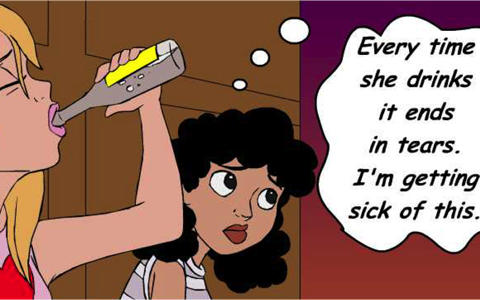Research staff:
NDARC: Prof Maree Teesson, Dr Nicola Newton, A/Prof Tim Slade, Dr Cath Chapman, Dr Louise Mewton, Ms Louise Birrell, Ms Zoe Tonks, Ms Katrina Champion, Ms Natasha Nair.
NDRI: Prof Steve Allsop, A/Prof Nyanda McBride, Ms Nina te Pas.
Other: Prof Gavin Andrews & Louise Brown (UNSW); Prof Leanne Hides, Nina Pocuca & Simone Firmin-Sara (Queensland University of Technology); Prof Patricia Conrod (University of Montreal).
Why did we undertake this research?
More than one quarter of Australian teenagers put themselves at risk of short-term alcohol-related harm at least once a month and one in six will have used an illicit drug in the last year. The burden of disease, social costs, and disability associated with this use is considerable. The peak of this disability occurs in those aged 15-24 years and corresponds with the typical age of initiation of alcohol and drug use. The high prevalence of substance use amongst adolescents is of particular concern given that early initiation to drug use is a risk factor for the development of substance use disorders, co‐morbid mental health problems, juvenile offending, impaired educational performance and early school drop‐out, all of which negatively impact on both current functioning and future life options. Mental disorders also typically have their onset in late adolescence and share many common risk factors with harmful alcohol and drug use.
To reduce the occurrence and cost of such problems, prevention is essential and needs to be initiated early before harmful patterns of drug use and poor coping skills are established and begin to cause disability. One approach is universal school prevention, where the prevention intervention is delivered to all students in a school year. Although an array of universal school-based prevention programs exist, the majority show minimal effects in reducing drug use and related harms. The most common factors which interfere with effectiveness are the focus on abstinence‐based outcomes and failure of programs to be implemented correctly.
The programs which have demonstrated the most success in increasing drug related knowledge, decreasing pro-drug attitudes and decreasing drug use behaviour, are those programs which have a harm-minimisation goal, are implemented correctly and use interactive delivery techniques. The School Health and Alcohol Harm Reduction Project (SHAHRP) program developed by the National Drug Research Institute at Curtin University in Perth is an innovative example of this. For mental disorders, program effectiveness is most often impacted by a failure to implement the programs in practice.
Our researchers have undertaken this research into prevention as we have a passion to develop innovative, engaging interventions which are sustainable and effective. Our research brings together international research leaders to implement a novel model of mental health and substance use prevention.
To address the burden of mental disorders and drug and alcohol harms we need to develop and test innovative prevention models which:
1. Address anxiety, depression and substance use, and
2. Overcome the many obstacles to effective implementation and dissemination of school-based prevention programs.
What did we do?
Since 2002, we have been developing the The 'Climate Schools’ programs for prevention. The Climate Schools programs were pioneered by Professors Maree Teesson, Gavin Andrews and Dr Nicola Newton (whose doctoral thesis investigated aspects of the program). Climate Schools uses cartoon story boards to engage and maintain student interest and involvement over time. The programs are facilitated by the internet which guarantees complete and consistent delivery whilst ensuring high implementation fidelity.
The ‘Climate Schools’ program for alcohol and cannabis is designed to fit within the school health curriculum and be implemented in Year 8 before significant exposure to alcohol and drug use. It is based on harm minimisation and social influence principles. The Climate Schools program for alcohol and cannabis consists of twelve 40-minute lessons aimed at reducing the use of alcohol and cannabis and related harms. The first six lessons focus specifically on alcohol and are delivered approximately six months prior to the remaining six lessons which focus on cannabis.
The first part of each lesson is completed individually over the internet where students are engaged through cartoon storylines which impart information about the short- and long-term effects of alcohol and cannabis, normative alcohol and cannabis use, refusal skills, and first aid. Students are provided with confidential login details to access the Climate Schools website. The second part of each lesson is a group or class activity delivered by the teacher which reinforces the information in the cartoons and allows interactive communication between students. Teachers are provided with a manual containing the activities, implementation guidelines, links to the education syllabus and summaries for each lesson.
The ‘Climate Schools’ program for overcoming anxiety and combating depression is a universal prevention course based on adolescent cognitive behavioural principles. Each lesson aims to teach students to identify symptoms of depression and anxiety and teaches them how to deal with these effectively. The programs incorporate skill acquisition, psycho education, management of psychological symptoms, cognitive symptoms, behaviour and additional skills specific to each disorder. The lessons run for 40 minutes using blended (online and classroom) teaching techniques. In the first component of each lesson, students undertake a 20 minute self-directed internet delivered program following a cartoon storyboard of teenagers experiencing and solving real life problems with anxiety and depression. In the second component of each lesson teachers use predetermined activities and resources to reinforce the information learnt in the lesson.
The potential of the Climate schools modules to present material in an interactive format to thousands of students in diverse locations at the same time is unique.
We have now completed four randomised controlled trials testing the effectiveness of these interventions with over 5000 students. The intervention is listed on the prestigious US SAMHSA National Register of Evidence based Prevention Programs. We have new programs being developed in emerging drugs and psychostimulants and linking our universal programs with targeted interventions.
What did we find out?
The efficacy of the Climate Schools program has been established using cluster randomised controlled trials. Our randomised controlled trials in 10 schools in Sydney, Australia (n = 764 students) demonstrated that compared to students in the control group who received their usual drug education over the year, students in the intervention group showed significant improvements in alcohol and cannabis knowledge at end of the course and at six and 12 months following the intervention. In relation to behaviour change, the intervention group showed a reduction in frequency of cannabis use at the six-month follow-up, a reduction in average weekly alcohol consumption at the six and 12 month follow-ups, and a reduction in frequency of drinking to excess twelve months following the intervention. In addition, program evaluation showed that students and teachers rated the program as an acceptable and enjoyable means of delivering drug education in schools. Specifically, 100% of teachers who implemented this program in their classroom rated it as superior to other drug prevention programs, and over 90% of students reported information delivered in this format was easy to learn and would like more school subjects to be taught using this method.
What does it mean?
This program offers the potential of a paradigm shift in prevention of common mental disorders. Mental health and substance use problems among young Australians are a serious concern, yet few prevention strategies exist which are effective in decreasing these problems, none offer a combined approach to these problems and none appear to be universally feasible. Our research has developed a comprehensive prevention model that can be rolled out across all schools in Australia. This intervention has the potential to reduce alcohol and other drug use, and reduce risk factors for anxiety and depression. Our interventions are in part faciliated by the internet and in part manualised, thereby guaranteeing implementation fidelity. The story boards are designed with young people to ensure engagement and relevance of the program. It represents a utility that is practical, acceptable, fits within the national curriculum, and is scalable to meet the needs of all schools in Australia. It is a significant contribution to promoting and maintaining the good health of the community in Australia.
















